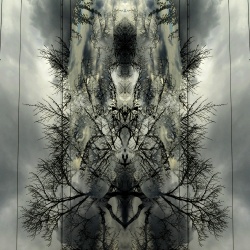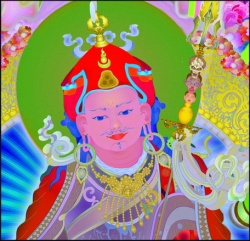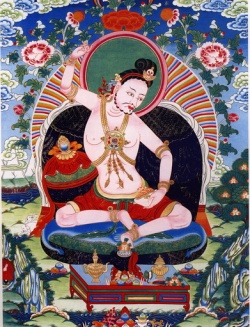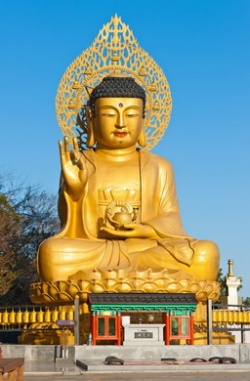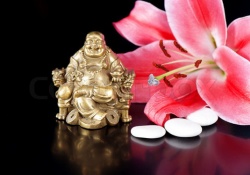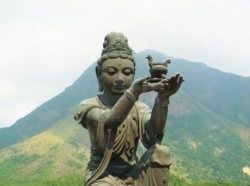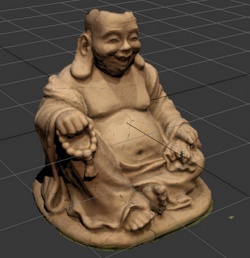Nirvana Sutra: Chapter Thirty-Five: On Bodhisattva Lion's Roar (c)
Mahayana Mahaparinirvana Sutra
Translated by KOSHO YAMAMOTO
FROM Dharmakshema's Chinese version
The World's genuinely first-ever web edition of this complete scripture
(This "Yamamoto/page edition" is Copyright of Dr. Tony Page, 2004 )
The Complete Kosho Yamamoto English Translation of the "Nirvana Sutra", edited and revised by Dr. Tony Page, typographically improved by Jay and Gabriele Mazo
Chapter Thirty-Five: On Bodhisattva Lion's Roar (c)
Lion's Roar said: "O World-Honoured One! You the Buddha say that all things have two causes. One is the right cause and the other the condition. Through these, there cannot be any breaking away from bondage. The five skandhas appear and die out moment after moment. If these appear and die out, who binds and unbinds? O World-Honoured One! The present five skandhas call forth the five skandhas that follow. This skandha dies out by itself and does not shift on to another skandha. Though not shifting on, this can well call forth the other skandha. From a seed, we gain a bud. But the seed does not shift on to the bud. Though it does not shift on to the bud, it indeed calls forth the bud. The same is the case with beings. How do we undo bondage?"
"O good man! Listen carefully, listen carefully. I shall now explain (matters) to you minutely. O good man! When a person is going to die and faces the greatest of sorrows, the relatives gather around, weep, and are lost in sorrow. The person himself is in fear and knows of no help. He has his five sense-organs, but the sense-function does not work. His limbs shake and he indeed cannot hold (maintain) his own body. The body is empty and cold, and warmth is about to depart. He sees before his own eyes all the karmic results of what he has done.
"O good man! The sun is about to go down over the horizon, and the mountains and hills and mounds present shadows which shift on to the east. Reason tells (us) that there cannot be any moving to the west. It is the same with the fruition of a man's karma. When this skandha dies, another arises. When light appears, gloom dies out; when the light vanishes, the gloom appears. O good man! When a stamp (seal) of wax is pressed into mud, the stamp becomes one with the mud. The stamp dies out, and there appear letters. And yet, this wax stamp does not change into mud, and those letters come about from mud. They do not come about from anywhere else. They come about by reason of the causal relations of the stamp. Things obtain thus.
"When the skandhas of the present life die out, an in-between existence comes about. It is not that the skandhas of the present life change into the skandhas of the in-between five skandhas. And, also, the in-between five skandhas do not come about by themselves. They do not come about from anywhere else. Through the present skandhas come about the in-between skandhas. The stamp presses upon the mud. It dies out and letters emerge. The name does not differ. But the time of each differs. Such is the case. That is why I say: "The in-between five skandhas cannot be seen with the fleshly eye; they are what can be seen with the heavenly eye." The in-between skandhas feed on three kinds of food: 1) food of thought, 2) food of touch, 3) food of will. The in-between skandhas are made up of two kinds, which are: 1) good karmic fruition, and 2) evil karmic fruition. From good action comes about the consciousness of good karma, and from evil action the consciousness of evil (results).
"When the parents join together in sexual union, the causal relations call forth the direction in which the life must proceed. The mother gains craving (“trishna”) and the father anger. When the semen of the father comes forth, he says: "This is mine." At that, his mind becomes pleased. These three kinds of defilement crush out the in-between skandhas of causal relations and the subsequent five skandhas come about. This is comparable to how the stamp gets impressed into the mud and letters emerge.
"When appearing, all the sense-organs are perfect or imperfect. One who is equipped thus sees "matter" (i.e. physical form) and acquires greed. Greed arises, which is craving. By madness, greed comes about. This is ignorance. Through the causal relations of greedy craving and ignorance, the world that is seen is all upside-down. The non-Eternal is viewed as Eternal, the non-Self as the Self, non-Bliss as Bliss, and the non-Pure as the Pure. From these four inversions, good and bad actions are committed. Defilement makes karma, and karma activates defilement. This is bondage. On this account, we say born of the five skandhas.
"For this person, when he befriends the Buddha, the Buddha's disciples, and the good teachers of the Way, and when he listens to the 12 types of sutra, because of his hearing Dharma, there comes about a realm of good. When he sees the realm of good, he gains great Wisdom. Great Wisdom is right seeing. When he gains (such) seeing, he repents of the life of birth and death. In consequence of this regret, no joy arises (regarding samsara - birth and death). When he gains no joy, he truly destroys the greedy mind. When he destroys the greedy mind, he practises well the Noble Eightfold Path. When he practises the Noble Eightfold Path, he emerges from birth and death. When there is no birth and death, he gains Emancipation. When fire does not meet with fuel, this is extinction. When there is no more birth and death, we say that we cross over extinction. This is the extinction of the five skandhas."
Lion's Roar said: "There is no thorn in the Void. How can we speak of extracting? None chains the skandhas. How can there be any binding?"
The Buddha said: "O good man! The chain of defilement binds the five skandhas. Away from the five skandhas, there is no defilement; away from defilement, there are no five skandhas.
"O good man! Pillars support a house. Away from the house, there are no pillars, and without any pillars, there is no house. It is the same with the five skandhas of beings. When there is defilement, we speak of bondage. When there is no defilement, we speak of Emancipation. O good man! The fist contains the palm. The three items of bondage, meeting and dispersion, birth and death, are not different things. The same is the case with the five skandhas of beings. When there is defilement, we have bondage; when we have no defilement, there is Emancipation.
"O good man! We say that body-and-mind (“nama-rupa”) chains beings. But if body-and-mind have gone, there is no being. Other than body-and-mind, there is no being; other than the being, there is no other body-and-mind. Also, we say that body-and-mind chains the being, and the being chains the body-and-mind."
Lion's Roar said: "O World-Honoured One! The eye does not see by itself, the finger does not touch by itself, the sword does not cut by itself, and feeling does not feel by itself. But why does the Tathagata say: "Body-and-mind chains the body-and-mind?" Why? Body-and-mind is none but the being; the being is body-and-mind. If we say that body-and-mind chains the being, this means that body-and-mind chains body-and-mind."
The Buddha said: "O good man! When two hands meet, there cannot be anything that comes in between. It is the same with body-and-mind. That is why I say: "Body-and-mind chains the being." If one is away from body-and-mind, what there is (then) is Emancipation. That is why I say: "The being attains emancipation."
Lion's Roar said: "O World-Honoured One! If body-and-mind chains one, all arhats are not away from body-and-mind. So they may well be chained."
"O good man! There are two kinds of Emancipation, which are: 1) cutting off of the seed, and 2) cutting off of fruition. The cutting off of the seed is the cutting off of defilement. The arhats have already cut off defilement and the root of all bondage has been severed, so that the bondage of the seed cannot chain (the arhat). When the root of fruition is not yet cut off, we say that there is yet the bondage of fruition. All arhats do not see the Buddha-Nature. Not seeing this, they cannot gain unsurpassed Enlightenment. For this reason, we may say that there is the bondage of fruition. So, we cannot say that there is a bondage of body-and-mind. O good man! For example, when the oil has not yet been spent, the light of the lamp does not expire. Once the oil is spent, the light goes out. In this, there is nothing to doubt. O good man! The so-called oil is defilement, and the light is the being. All beings do not gain Nirvana, due to the oil of defilement. If this is removed, they gain Nirvana."
Lion's Roar said: "O World-Honoured One! The nature of light and oil differs. Defilement and the being are not thus. The being is defilement and defilement is the being. The being is the five skandhas and the five skandhas are the being. The five skandhas are defilement and defilement is the five skandhas. Why do you, the Tathagata, liken them to light?"
The Buddha said: "Of analogies, there are eight kinds, namely: 1) progressive analogy, 2) reverse analogy, 3) actual analogy, 4) non-analogy, 5) fore-going analogy, 6) aft-coming analogy, 7) fore-going-and-aft-coming analogy, and 8) all-pervading analogy.
"What is a progressive analogy? It is as when I say in the sutras, for example, heaven sends down great rain, and all the ditches become full. As they are full, small holes get full. As small holes get filled, the great holes too become full. As the great holes become full, small springs become full. As small springs become full, great springs become full. As great springs become full, small ponds become full. As small ponds become full, big ponds become full. When big ponds are full, small rivers become full. When small rivers become full, big rivers become full. When big rivers become full, the great seas become full. The same is the case with the rain of Dharma of the Tathagata.
"The silas (moral behaviour) of beings become full (i.e. perfect). As the silas are full, the non-repenting mind becomes full. As the non-repenting mind becomes full, there arises joy. As joy arises, segregation (from attachment to the skandhas) comes about. As segregation becomes full, there comes about peace. As peace becomes full, samadhi becomes full. As samadhi becomes full, right seeing-and-knowing becomes full. As right seeing-and-knowing becomes full, renunciation becomes full. As renunciation becomes full, the reproach (i.e. aversion to worldly life) becomes full. As reproaching becomes full, Emancipation becomes full. As Emancipation becomes full, Nirvana becomes full. This is a progressive analogy.
"What is a reverse analogy? Originally there was a great sea. This was a big river. The big river was originally a small river. There was a small river, which was a big pond. There was a big pond originally, which was a small pond. There was a small pond originally, which was a big spring. There was a big spring originally, which was a small spring. There was a small spring, which was a big hole. There was a big hole originally, which was a small hole. There was a small hole originally, which was a ditch. There was a ditch originally, which was great rain.
"There was Nirvana originally, which was Emancipation. There was originally Emancipation, which was reproach. There was reproach originally, which was renunciation. There was renunciation originally, which was right seeing-and-knowing. There was right seeing-and-knowing originally, which was samadhi. There was samadhi originally, which was peace. There was peace originally, which was segregation. There was segregation originally, which was the mind of joy. There was joy originally, which was non-regret. There was non-regret originally, which was the upholding of the precepts. There was upholding of the precepts originally, which was the rain of Dharma. This is an analogy in reverse order.
"What is an actual analogy? It is as when I say in the sutras that the mind of a being is like that of a monkey. The nature of a monkey is to throw (things) away and pick (things) up. The nature of a being is the same. It clings to colour, sound, smell, touch, and law (taste), and there is not a moment when it is at rest. This is an actual analogy.
"What is a non-analogy? It is as when I said to Prasenajit: "O great King! There are intimate friends come from the four quarters, who say: (O great King! There are four great mountains which come from the four quarters and mean to cause harm to man). Should you, the King, hear of this, what would you intend to do to deal with the situation?" The King said: "O World-Honoured One! They may come, but there is no place in which to take refuge. All one can do is exclusively uphold the precepts and give alms." I praised him and said: "Well said, well siad, O great King! I speak of four mountains. These are none other than the birth, old age, illness, and death of beings. Birth, old age, illness and death always come and press upon a person. How can one not practise the precepts and dana?" The King said: "O World-Honoured One! What does one gain from the precepts and dana?" I said: "One gains pleasure in the life of humans and heaven." The King said: "O World-Honoured One! If the nyagrodha were to practise the precepts and dana, could it call forth peace and bliss (for itself) in the world of humans and heaven?" I said: "The nyagrodha cannot uphold the precepts and give. If it could, there could result nothing that is different." This is a non-analogy.
"What is a fore-going analogy? This is as when I say in the sutra, for example, there is a wonderful flower to which a person clings (i.e. which that person desires). Intending to take hold of it, he is taken by the water (i.e. falls into the river). The same is the case with the being. He clings to the five desires and flounders in the river of birth, old age, and death. This is a fore-going analogy.
"What is an aft-coming analogy? It is as is given in the Dharmapada:
"Do not belittle any small evil
And say that no ill comes about therefrom.
Small is a drop of water,
Yet it fills a big vessel."
This is an aft-coming parable.
"What is a fore-and-aft analogy? This is as in the case of a plantain tree, which, when it bears fruit, dies. It is the same with the ignorant, who but receives support. It is as in the case of a mule, which, when it bears a child, cannot live long.
"What is an all-pervading analogy? This is as when I state in the sutra: In Trayastrimsa Heaven, there is a tree called parijata, whose roots go down into the earth five yojanas deep and whose height is as great as 100 yojanas. Its branches and leaves spread out as far as 50 yojanas. When the leaves ripen, they become yellow, and all the gods, on seeing this, are gladdened. These leaves, before long, fall off. When the leaves fall, there comes about joy. This branch changes colour, and joy arises. This branch, before long, gains pimples. Seeing this, joy again comes about. This pimple again calls forth a bill. Having seen this, joy arises again. Not long after the bill opens, a fragrance covers an area of 50 yojanas, and a light shines over a distance of 80 yojanas. All devas (gods), in the three summer months, come down, and there is joy down below.
"O good man! It is the same with all of my disciples. Saying that the leaves become yellow can be likened to my disciples who desire renunciation. Saying that the leaves fall down can be likened to my disciples' shaving their heads. Saying that the colour of the leaves changes refers to my disciples' taking to the “jnaticaturtha” and receiving the complete precepts. Saying that first a pimple appears refers to the disciples' minds aspiring to unsurpassed Bodhi and the bill to the Bodhisattvas of the ten abodes who now gain the Buddha-Nature. Saying that it opens refers to the Bodhisattvas' attaining of unsurpassed Bodhi. "Fragrance" refers to the innumerble beings of the ten directions upholding the precepts. "Light" is likened to the Buddha's name filling the ten directions unhindered. "The three summer months" are comparable to the three samadhis. Saying that in Trayastrimsa Heaven one enjoys bliss is likened to all Buddhas' gaining Great Nirvana and the Eternal, Bliss, the Self, and the Pure. This is an all-pervading analogy.
"The analogies spoken of do not necessarily cover all (aspects). They liken things in part, or in greater part, or to the whole. It is as when we say: "The face of the Tathagata is like the full moon." This refers to but a small part.
"O good man! There is a man, for example, who has not yet seen milk. He asks others what it is like: "What kind of thing is milk?" The others answer: "It is like water, honey, and a shell." The water represents moisture, the honey sweetness, and the shell colour. We may employ these three analogies and yet we may not be able to arrive at (an accurate idea of) what milk is. O good man! I may use the analogy of light. But the case will be thus. O good man! There cannot be any river apart from water. The same is the case with beings. Apart from the five skandhas, there can be no other separate being. O good man! Apart from the body, wheels, spokes, and hubs, there cannot be any cart. It is the same with beings.
"O good man! If you deisre to connect this with the analogy of light, listen carefully, listen carefully! I shall now explain it. The wick may be likened to the 25 existences, the oil is craving, and light Wisdom. To break means to exclude gloom and ignorance. Softness is likened to the Holy Way. When the oil is used up, the brightness of the light dies out. The same is the case (here). When the craving of the being ends, there comes about the Buddha-Nature. There can be body-and-mind, but this cannot bind (one). Living amidst the 25 existences, there is no defilement from any existence."
Lion's Roar said: "O World-Honoured One! The five skandhas of the being are empty and there is no means of possessing. Who is there that receives the teaching and practises the Way?"
The Buddha said: "O good man! All beings have the remembering mind, the wisdom mind, the aspiring mind, the effort-making mind, the believing mind, and the meditating mind. All such, moment after moment, are born and die away. And yet, similarity and continuation go on. Hence, we speak of practising the Way."
Lion's Roar said: "O World-Honoured One! All such die away moment after moment. All such extinctions that come about moment after moment also resemble (one another) and continue. How is one able to practise the Way?"
The Buddha said: "O good man! The light of the lamp dies out moment after moment. Yet, there is the light which dispels the gloom. It is the same with all such resemblings. O good man! The food a being eats dies away moment after moment, but hunger is satisfied. The case is the same. A good medicine dies away moment after moment. And yet it does indeed cure illness. The light of the sun and moon dies away moment after moment, and yet it truly enables the trees and plants of the forest to grow.
"O good man! You say: "A person dies moment after moment. How can there be any growing up?" But as the mind is not cut off, there is growing. O good man! A man recites. The letters (words) read cannot happen in a moment. What came first cannot extend to the middle, and what was read in the middle cannot go to the end. The man, the letters and the mental image die out moment after moment, and practising long we come to know.
"O good man! For example, with a goldsmith, from the day when he begins to learn his art up to those of his hoary old-age, one moment is followed by another moment, and what has preceded is what follows after. But by repeated practice, what comes about is wonderful. Due to this, the person is praised and is called the best goldsmith. It is the same with reading the sutras.
"O good man! For example, let us take the case of a seed. The earth does not teach it and say: "Put forth buds!" But by the law of nature, buds come about. And then the flower, too, does not teach and say: "Now, bear fruit!" But fruit comes about as it should by the law of nature. It is the same with the practice of the Way. O good man! For example, in counting, one is not two, and two is not three. Moment after moment, one shifts on to the other. Yet, this goes up to 1,000 and to 10,000. Thus does the practice of the Way by beings proceed. O good man! The light of a lamp dies moment after moment. When the first light dies out, it does not say to the flame that follows: "I am going now. You now appear and dispel the gloom!" The case is thus. O good man! When a calf is born, it seeks milk. None teaches it this wisdom of seeking milk. A moment is followed by a moment, but the first hunger leads to satisfaction with the food that follows. Hence, know that one cannot be the same as others. If the same, no difference can come about. The same applies to the practice of the Way by a being. By one action, one may not gain the end. But by long practice, one does away with all defilements."
Lion's Roar said: "Just as the Buddha says that when a person of the srotapanna stage (i.e. a person who has "entered the stream" of Dharma and will be reborn a maximum of only 7 further times) gains the fruition of the practice of the Way, even though born in evil lands, he upholds the precepts, does not kill, steal, seek after lust, practise double-tongue, or drink alcohol, the skandhas of the srotapanna die out here and do not gain the evil lands - the same applies to the practice of the Way. It does not lead to evil lands. Why can the person not get born in the Pure Land, if the same? If the skandhas of the evil land are not those of the srotapanna, how can it be that evil actions cannot come about?"
The Buddha said: "O good man! A person of the srotapanna stage may get born into evil lands, and yet he will not lose his attainment of srotapannahood. The skandhas are not the same. That is why I take up the analogy of the calf. A person of the srotapanna stage, though born in an evil land, because of the power of his practice of the Way, does not perform evil. O good man! For example, in Gandhamadana, there was a lion king, and all the birds and beasts left the mountain - none of them came near. Once, this king went into the Himalayas, and there, too, he saw that none was living there. That is how things stand with the srotapanna. Though not practising the Way, because of the power of the Way, he does not perform evil. For example, a man takes amrta (ambrosia of immortality). And the amrta dies out. But the force of its remaining power causes the person to gain birthlessness and deathlessness. O good man! In Mount Sumeru, there is a wonderful medicine called langali. If one partakes of it, even though the effect of the medicine dies out moment after moment, one, due to the power of this medicine, will not encounter any harm. O good man! No one approaches where a Chakravartin lives, not even in his absence. Why not? Because of the power of this king. It is the same with the person of the srotapanna stage. He may be born in an evil land and may not be practising the Way, but because of the power of the Way, he does not do any evil. The skandhas of the srotapanna may be dead, and different skandhas may be present, and yet no skandha of the srotapanna is lost. O good man! Beings, because of what emerges from the fruit, do a good many things to the seed: they provide dung and irrigation. Although the fruit has not yet been gained and the seed is now dead, we nevertheless can say that we gain the fruit from the seed. It is the same with the skandhas of the srotapanna. O good man! For example, there is a man who is rich and has great wealth. He has only one son, who has already died. This son has a son, who is now abroad. This man, of a sudden, dies. The grandson, on hearing of this, comes back and takes over the property. It is not yet known where the wealth is. But there is no one who obstructs or protects the occupation. Why not? Because the stock is one. The case is the same with the skandhas of the srotapanna."
Bodhisattva Lion's Roar said: "O World-Honoured One! You, the Buddha, said in a gatha:
"If a bhiksu (monk) practises the Way
Of the moral precepts, samadhi and Wisdom,
Know that this is befriending
Unretrogressive and great Nirvana."
O World-Honoured One! How am I to practise the precepts, samadhi and Wisdom?
The Buddha said: "O good man! There is a man who upholds the prohibitions and precepts, but (does so) for the happiness that he can gain for his own self and for humans and gods, and not to save all beings, not for guarding unsurpassed Wonderful Dharma, but for profit and out of fear of the three unfortunate realms, for life, lust, power, safety, oratory, out of fear of state laws, evil fame, for fear of dirty names, and for worldly works. Such guarding and upholding of the precepts cannot be called practising the precepts. O good man! What is true upholding of sila? When one upholds sila, the object must be to pass beings to the other shore, to protect Wonderful Dharma, to save the unsaved, to enlighten the unenlightened, to enable those who have not yet taken refuge to take it, to enable those who have not yet attained Nirvana to attain it. Practising thus, a person does not see sila, how it is actually upheld, the person who upholds sila, the results to be attained (therefrom), whether the person has sinned or not. O good man! If one acts thus, this is the upholding of sila.
"How does one practise samadhi? If, when practising samadhi, one does it to enlighten one's own self, for profit, not for the sake of all beings, not for the practising of Dharma, but out of greed, for defiled food, for sexual reasons, because of the impurities of the nine holes, for disputes, for beating, and for killing others, anybody who practises samadhi thus is not one who practises samadhi.
"O good man! What is the true practice of samadhi? One practises it for the sake of all beings, to plant in the mind of beings the all-equal mind, unretrogressive Dharma, the holy mind, to enable beings to attain Mahayana, to guard unsurpassed Dharma, for beings not to retrogress from Enlightenment, for them to gain the Suramgama, the vajra-samadhi, dharanis (i.e. long mantras or magic spells), to enable beings to gain the four unhinderednesses, to enable beings to see the Buddha-Nature; and when practising thus, one sees no samadhi, no form of samadhi, nor a person practising this, nor any result to be arrived at. O good man! If things indeed proceed thus, we say that this person is practising samadhi.
"How does one practise Wisdom? One who practises Wisdom thinks: "If I practise such Wisdom, I shall attain Emancipation and save those in the three unfortunate realms. Who is it that indeed benefits all beings, passing them to the other shore beyond birth and death? It is difficult (to be present when) the Buddha appears in this world. It is as rare an event as one's coming across the flowering of the udumbara. I shall now thoroughly cut away the bonds of all defilements. I shall gain the fruition of Emancipation. On this account, I shall now learn to practise Wisdom and sever the bond of defilement and attain Emancipation." Any person who practises the Way thus is not one who practises Wisdom.
"How does a person truly practise Wisdom? The wise person meditates on the sorrows of birth, age, and death. All beings are overshadowed by ignorance and do not know how to practise the unsurpassed right path. He prays: "I pray that this body of mine will suffer great sorrows in lieu of all beings. Let all poverty, degredation, the mind of transgressing the precepts, all the actions of greed, anger and ignorance of all beings gather upon me. I pray that all beings will not gain a mind of greed, will not be bound up in body-and-mind. I pray that all beings will soon cross the sea of birth and death, so that I may not now need to face it and not feel the worry. I pray that all will gain unsurpassed Enlightenment." When a person practises the Way thus, he sees no Wisdom, no form of Wisdom, no one practising WIsdom, and no fruition to be arrived at. This is practising Wisdom.
"O good man! One who thus practises sila, samadhi, and Wisdom is a Bodhisattva; one who cannot thus practise sila, samadhi, and Wisdom is a sravaka.
"O good man! How does one practise sila (morality)? All sin by committing the 16 evil acts. What are the 16? They are: 1) keeping, feeding, and fattening sheep for profit, and seeling them, 2) buying and killing sheep for profit, 3) raising, fattening and selling pigs for profit, 4) buying and killing them for profit, 5) raising and selling calves for profit when fattened, 6) buying and killing them for profit, 7) raising hens for profit and, when they are grown up, selling them, 8) buying (them) for profit and killing them, 9) fishing, 10) hunting, 11) plundering, 12) selling fish, 13) catching birds with nets, 14) (having a) double-tongue, 15) (being a) jailer, and 16) charming snakes (“nagas”). One (should) thoroughly segregate one's self eternally from such evil deeds. This is practising sila (morality)."
Source
Continue Reading
- Nirvana Sutra: Chapter One Introductory
- Nirvana Sutra: Chapter Two: On Cunda
- Nirvana Sutra: Chapter Three: On Grief
- Nirvana Sutra: Chapter Four: On Long Life
- Nirvana Sutra: Chapter Five: On the Adamantine Body
- Nirvana Sutra: Chapter Six: On the Virtue of the Name
- Nirvana Sutra: Chapter Seven: On the Four Aspects
- Nirvana Sutra: Chapter Eight: On the Four Dependables
- Nirvana Sutra: Chapter Nine: On Wrong and Right
- Nirvana Sutra: Chapter Ten: On the Four Truths
- Nirvana Sutra: Chapter Eleven: On the Four Inversions
- Nirvana Sutra: Chapter Twelve: On the Tathagata-DHATU
- Nirvana Sutra: Chapter Thirteen: On Letters
- Nirvana Sutra: Chapter Fourteen: On the Parable of the Birds
- Nirvana Sutra: Chapter Fifteen: On the Parable of the Moon
- Nirvana Sutra: Chapter Sixteen: On the Bodhisattva
- Nirvana Sutra: Chapter Seventeen: On the Questions Raised by the Crowd
- Nirvana Sutra: Chapter Eighteen: On Actual Illness
- Nirvana Sutra: Chapter Nineteen: On Holy Actions-1
- Nirvana Sutra: Chapter Twenty: On Holy Actions-2
- Nirvana Sutra: Chapter Twenty-One: On Pure Actions-1
- Nirvana Sutra: Chapter Twenty-Two: On Pure Actions-2
- Nirvana Sutra: Chapter Twenty-Three: On Pure Actions-3
- Nirvana Sutra: Chapter Twenty-Four: On Pure Actions-4
- Nirvana Sutra: Chapter Twenty-Five: On Pure Actions-5
- Nirvana Sutra: Chapter Twenty-Six: On the Action of the Child
- Nirvana Sutra: Chapter Twenty-Seven: Bodhisattva Highly-Virtuous King-1
- Nirvana Sutra: Chapter Twenty-Eight: Bodhisattva Highly-Virtuous King-2
- Nirvana Sutra: Chapter Twenty-Nine: Bodhisattva Highly-Virtuous King (c)
- Nirvana Sutra: Chapter Thirty: Bodhisattva Highly-Virtuous King (d)
- Nirvana Sutra: Chapter Thirty-One: Bodhisattva Highly-Virtuous King (e)
- Nirvana Sutra: Chapter Thirty-Two: Bodhisattva Highly-Virtuous King (f)
- Nirvana Sutra: Chapter Thirty-Three: On Bodhisattva Lion's Roar (A)
- Nirvana Sutra: Chapter Thirty-Four: On Bodhisattva Lion's Roar (b)
- Nirvana Sutra: Chapter Thirty-Five: On Bodhisattva Lion's Roar (c)
- Nirvana Sutra: Chapter Thirty-Six: On Bodhisattva Lion's Roar (d)
- Nirvana Sutra: Chapter Thirty-Seven: On Bodhisattva Lion's Roar (e)
- Nirvana Sutra: Chapter Thirty-Eight: On Bodhisattva Lion's Roar (f)
- Nirvana Sutra: Chapter Thirty-Nine: On Bodhisattva Lion's Roar (g)
- Nirvana Sutra: Chapter Forty: On Bodhisattva Kasyapa (a)
- Nirvana Sutra: Chapter Forty-One: On Bodhisattva Kasyapa (b)
- Nirvana Sutra: Chapter Forty-Two: On Bodhisattva Kasyapa (c)
- Nirvana Sutra: Chapter Forty-Three: On Bodhisattva Kasyapa (d)
- Nirvana Sutra: Chapter Forty-Four: On Bodhisattva Kasyapa (e)
- Nirvana Sutra: Chapter Forty-Five: On Kaundinya (a)
- Nirvana Sutra: Chapter Forty-Six: On Kaundinya (b)
